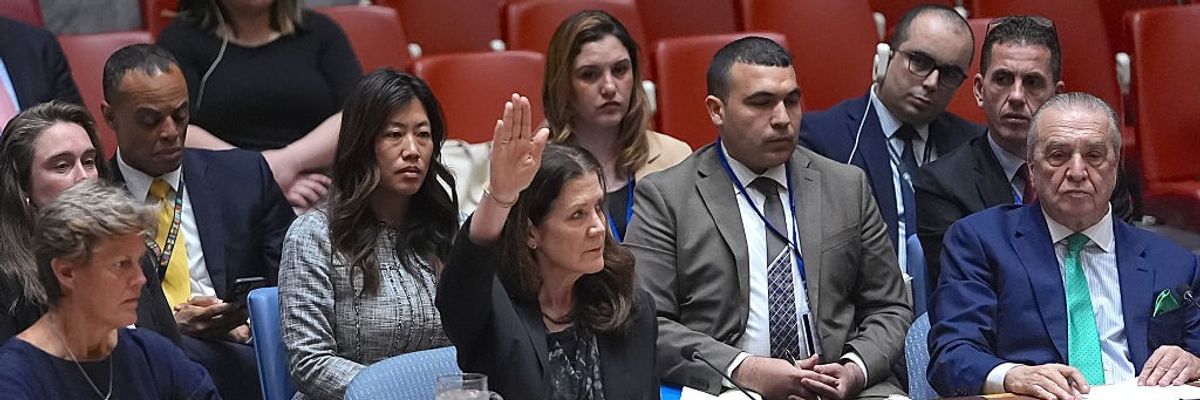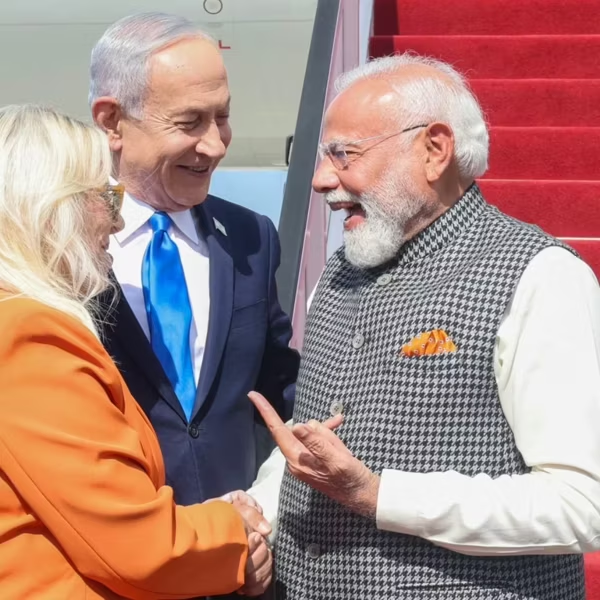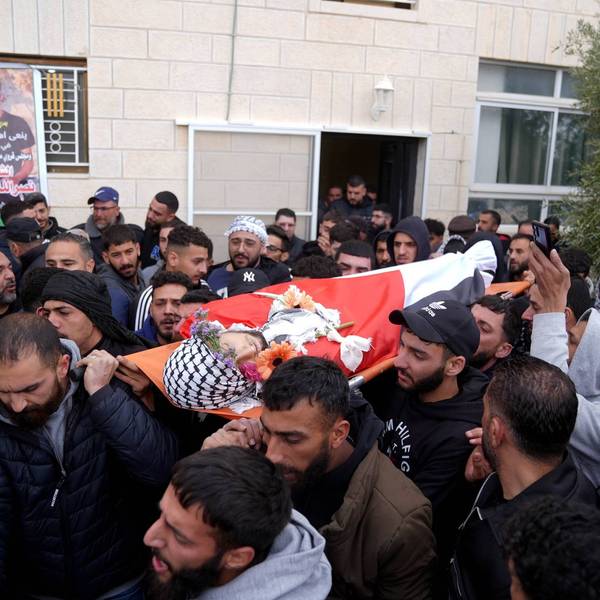
The United States again vetoes a U.N. Security Council resolution calling an 'immediate, unconditional, and permanent cease-fire' between Israel and Hamas on June 4, 2025, in New York City, United States.
Why Israeli Impunity Still Shapes Global Politics
Every time the world looks away, it signals to other aggressors that crimes can be committed without consequence, as long as the perpetrator has the right allies.
In a world increasingly defined by calls for accountability, human rights, and a rules-based international order, one glaring exception continues to shape global norms: Israel’s impunity. Despite decades of United Nations resolutions, extensive documentation of war crimes, and near-universal condemnation from civil society, Israel has consistently avoided meaningful consequences for its actions in occupied Palestine and beyond.
This impunity is not just a regional concern—it is a systemic issue that corrodes the credibility of international law. Israel’s treatment of Palestinians and the consistent shielding it receives from powerful allies like the United States create a precedent where international law becomes selectively enforced. In 2023 and 2024, Israel’s assault on Gaza reached levels of devastation previously unseen. Tens of thousands of civilians were killed, and more than a million displaced. According to Amnesty International, Israel used starvation as a weapon of war against civilians, a war crime under international law.
The bombing of hospitals, refugee camps, and humanitarian corridors was condemned by organizations such as Human Rights Watch, but the global response remained muted. Instead of sanctions or diplomatic isolation, Israel continued to receive arms and military support from the West. The United States, in particular, increased military assistance and used its veto power to block multiple U.N. Security Council resolutions calling for a cease-fire, most recently in June 2025.
The struggle for Palestinian rights is, ultimately, a struggle for the soul of the international system.
The consequences of this selective enforcement go far beyond the borders of Gaza. First, it emboldens authoritarian regimes worldwide to dismiss international law, citing the double standard applied to Israel. Second, it undermines the legitimacy of multilateral institutions, especially among Global South nations that have long decried Western hypocrisy. How can justice be demanded from others when it is not applied evenly?
This imbalance also undermines emerging efforts toward multipolarity. Coalitions like BRICS and the Non-Aligned Movement have made rhetorical commitments to a just world order. However, their credibility depends not only on economic cooperation but also on moral consistency. When they remain silent on Israel’s violations, they risk perpetuating the same hierarchy they claim to resist.
The issue is also deeply embedded in Western domestic politics. In the U.S., the so-called ”Palestine Exception” means that standard principles of free speech, human rights, and legal accountability are suspended when applied to Israel. Politicians and activists who question unconditional support for Israel often face severe professional and personal consequences. Meanwhile, countries like Germany and France have suppressed peaceful pro-Palestinian protests under the guise of combating antisemitism—even when such protests are rights-based and nonviolent.
Critics are not merely challenging Israeli policy; they are questioning a larger structure of Western dominance that hinges on exceptions. Israel’s impunity acts as a litmus test: Those who support it are often invested in preserving U.S.-led hegemony, while those who challenge it advocate for a global system based on equal rights and accountability.
The human cost is incalculable. Families have been wiped out, infrastructure destroyed, generations traumatized. And yet, the global community continues to debate whether the threshold for genocide has been crossed, rather than acting to stop it. A column in The Guardian recently described Gaza as a “killing field where people are being starved.” The language is clear, but the political will remains absent.
Ending Israeli impunity is not only a matter of justice for Palestinians—it is essential for restoring faith in international law. Selective justice is no justice at all. Every time the world looks away, it signals to other aggressors that crimes can be committed without consequence, as long as the perpetrator has the right allies.
Civil society has a role to play. Pressure must be maintained on governments to cut military aid, impose sanctions, and support international investigations into war crimes. Institutions like the International Criminal Court must be empowered, not obstructed. Media must resist censorship and double standards in their coverage.
As we face interconnected global crises—from climate collapse to growing authoritarianism—allowing one state to remain above the law undermines collective survival. The struggle for Palestinian rights is, ultimately, a struggle for the soul of the international system. It asks a simple question: Will we uphold justice, or allow power to define who deserves it?
An Urgent Message From Our Co-Founder
Dear Common Dreams reader, The U.S. is on a fast track to authoritarianism like nothing I've ever seen. Meanwhile, corporate news outlets are utterly capitulating to Trump, twisting their coverage to avoid drawing his ire while lining up to stuff cash in his pockets. That's why I believe that Common Dreams is doing the best and most consequential reporting that we've ever done. Our small but mighty team is a progressive reporting powerhouse, covering the news every day that the corporate media never will. Our mission has always been simple: To inform. To inspire. And to ignite change for the common good. Now here's the key piece that I want all our readers to understand: None of this would be possible without your financial support. That's not just some fundraising cliche. It's the absolute and literal truth. We don't accept corporate advertising and never will. We don't have a paywall because we don't think people should be blocked from critical news based on their ability to pay. Everything we do is funded by the donations of readers like you. Will you donate now to help power the nonprofit, independent reporting of Common Dreams? Thank you for being a vital member of our community. Together, we can keep independent journalism alive when it’s needed most. - Craig Brown, Co-founder |
In a world increasingly defined by calls for accountability, human rights, and a rules-based international order, one glaring exception continues to shape global norms: Israel’s impunity. Despite decades of United Nations resolutions, extensive documentation of war crimes, and near-universal condemnation from civil society, Israel has consistently avoided meaningful consequences for its actions in occupied Palestine and beyond.
This impunity is not just a regional concern—it is a systemic issue that corrodes the credibility of international law. Israel’s treatment of Palestinians and the consistent shielding it receives from powerful allies like the United States create a precedent where international law becomes selectively enforced. In 2023 and 2024, Israel’s assault on Gaza reached levels of devastation previously unseen. Tens of thousands of civilians were killed, and more than a million displaced. According to Amnesty International, Israel used starvation as a weapon of war against civilians, a war crime under international law.
The bombing of hospitals, refugee camps, and humanitarian corridors was condemned by organizations such as Human Rights Watch, but the global response remained muted. Instead of sanctions or diplomatic isolation, Israel continued to receive arms and military support from the West. The United States, in particular, increased military assistance and used its veto power to block multiple U.N. Security Council resolutions calling for a cease-fire, most recently in June 2025.
The struggle for Palestinian rights is, ultimately, a struggle for the soul of the international system.
The consequences of this selective enforcement go far beyond the borders of Gaza. First, it emboldens authoritarian regimes worldwide to dismiss international law, citing the double standard applied to Israel. Second, it undermines the legitimacy of multilateral institutions, especially among Global South nations that have long decried Western hypocrisy. How can justice be demanded from others when it is not applied evenly?
This imbalance also undermines emerging efforts toward multipolarity. Coalitions like BRICS and the Non-Aligned Movement have made rhetorical commitments to a just world order. However, their credibility depends not only on economic cooperation but also on moral consistency. When they remain silent on Israel’s violations, they risk perpetuating the same hierarchy they claim to resist.
The issue is also deeply embedded in Western domestic politics. In the U.S., the so-called ”Palestine Exception” means that standard principles of free speech, human rights, and legal accountability are suspended when applied to Israel. Politicians and activists who question unconditional support for Israel often face severe professional and personal consequences. Meanwhile, countries like Germany and France have suppressed peaceful pro-Palestinian protests under the guise of combating antisemitism—even when such protests are rights-based and nonviolent.
Critics are not merely challenging Israeli policy; they are questioning a larger structure of Western dominance that hinges on exceptions. Israel’s impunity acts as a litmus test: Those who support it are often invested in preserving U.S.-led hegemony, while those who challenge it advocate for a global system based on equal rights and accountability.
The human cost is incalculable. Families have been wiped out, infrastructure destroyed, generations traumatized. And yet, the global community continues to debate whether the threshold for genocide has been crossed, rather than acting to stop it. A column in The Guardian recently described Gaza as a “killing field where people are being starved.” The language is clear, but the political will remains absent.
Ending Israeli impunity is not only a matter of justice for Palestinians—it is essential for restoring faith in international law. Selective justice is no justice at all. Every time the world looks away, it signals to other aggressors that crimes can be committed without consequence, as long as the perpetrator has the right allies.
Civil society has a role to play. Pressure must be maintained on governments to cut military aid, impose sanctions, and support international investigations into war crimes. Institutions like the International Criminal Court must be empowered, not obstructed. Media must resist censorship and double standards in their coverage.
As we face interconnected global crises—from climate collapse to growing authoritarianism—allowing one state to remain above the law undermines collective survival. The struggle for Palestinian rights is, ultimately, a struggle for the soul of the international system. It asks a simple question: Will we uphold justice, or allow power to define who deserves it?
- 'This Is Genocide,' Amnesty International Says of Israel's Death Machine in Gaza ›
- At ICJ, Lawyer for Palestine Rips US for Defending 'Whatever Offenses' Israel Commits ›
- Trump National Security Advisor Pick Threatens ICC Over Netanyahu Arrest Warrant ›
- UN Expert Says Impunity for Israel Must End as 'Genocidal Violence' Spreads to West Bank ›
- House Democrats Say 'Impunity' for Israel Violates US Human Rights Law ›
- Gaza Journalists Demand End to Israel's Impunity for 'Genocide Against Us' ›
In a world increasingly defined by calls for accountability, human rights, and a rules-based international order, one glaring exception continues to shape global norms: Israel’s impunity. Despite decades of United Nations resolutions, extensive documentation of war crimes, and near-universal condemnation from civil society, Israel has consistently avoided meaningful consequences for its actions in occupied Palestine and beyond.
This impunity is not just a regional concern—it is a systemic issue that corrodes the credibility of international law. Israel’s treatment of Palestinians and the consistent shielding it receives from powerful allies like the United States create a precedent where international law becomes selectively enforced. In 2023 and 2024, Israel’s assault on Gaza reached levels of devastation previously unseen. Tens of thousands of civilians were killed, and more than a million displaced. According to Amnesty International, Israel used starvation as a weapon of war against civilians, a war crime under international law.
The bombing of hospitals, refugee camps, and humanitarian corridors was condemned by organizations such as Human Rights Watch, but the global response remained muted. Instead of sanctions or diplomatic isolation, Israel continued to receive arms and military support from the West. The United States, in particular, increased military assistance and used its veto power to block multiple U.N. Security Council resolutions calling for a cease-fire, most recently in June 2025.
The struggle for Palestinian rights is, ultimately, a struggle for the soul of the international system.
The consequences of this selective enforcement go far beyond the borders of Gaza. First, it emboldens authoritarian regimes worldwide to dismiss international law, citing the double standard applied to Israel. Second, it undermines the legitimacy of multilateral institutions, especially among Global South nations that have long decried Western hypocrisy. How can justice be demanded from others when it is not applied evenly?
This imbalance also undermines emerging efforts toward multipolarity. Coalitions like BRICS and the Non-Aligned Movement have made rhetorical commitments to a just world order. However, their credibility depends not only on economic cooperation but also on moral consistency. When they remain silent on Israel’s violations, they risk perpetuating the same hierarchy they claim to resist.
The issue is also deeply embedded in Western domestic politics. In the U.S., the so-called ”Palestine Exception” means that standard principles of free speech, human rights, and legal accountability are suspended when applied to Israel. Politicians and activists who question unconditional support for Israel often face severe professional and personal consequences. Meanwhile, countries like Germany and France have suppressed peaceful pro-Palestinian protests under the guise of combating antisemitism—even when such protests are rights-based and nonviolent.
Critics are not merely challenging Israeli policy; they are questioning a larger structure of Western dominance that hinges on exceptions. Israel’s impunity acts as a litmus test: Those who support it are often invested in preserving U.S.-led hegemony, while those who challenge it advocate for a global system based on equal rights and accountability.
The human cost is incalculable. Families have been wiped out, infrastructure destroyed, generations traumatized. And yet, the global community continues to debate whether the threshold for genocide has been crossed, rather than acting to stop it. A column in The Guardian recently described Gaza as a “killing field where people are being starved.” The language is clear, but the political will remains absent.
Ending Israeli impunity is not only a matter of justice for Palestinians—it is essential for restoring faith in international law. Selective justice is no justice at all. Every time the world looks away, it signals to other aggressors that crimes can be committed without consequence, as long as the perpetrator has the right allies.
Civil society has a role to play. Pressure must be maintained on governments to cut military aid, impose sanctions, and support international investigations into war crimes. Institutions like the International Criminal Court must be empowered, not obstructed. Media must resist censorship and double standards in their coverage.
As we face interconnected global crises—from climate collapse to growing authoritarianism—allowing one state to remain above the law undermines collective survival. The struggle for Palestinian rights is, ultimately, a struggle for the soul of the international system. It asks a simple question: Will we uphold justice, or allow power to define who deserves it?
- 'This Is Genocide,' Amnesty International Says of Israel's Death Machine in Gaza ›
- At ICJ, Lawyer for Palestine Rips US for Defending 'Whatever Offenses' Israel Commits ›
- Trump National Security Advisor Pick Threatens ICC Over Netanyahu Arrest Warrant ›
- UN Expert Says Impunity for Israel Must End as 'Genocidal Violence' Spreads to West Bank ›
- House Democrats Say 'Impunity' for Israel Violates US Human Rights Law ›
- Gaza Journalists Demand End to Israel's Impunity for 'Genocide Against Us' ›

